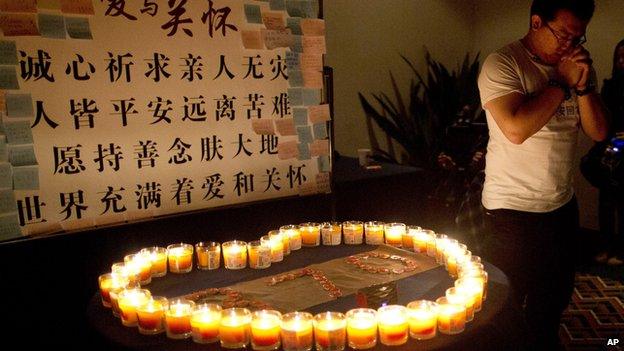MH370: New account of cockpit last words
- Published

Many of the passengers on the missing flight were Chinese nationals returning to Beijing
Malaysian authorities have issued a new version of the last communication between air traffic control and the cockpit of the missing flight MH370.
The last words spoken were "Good night Malaysian three seven zero" - and not "all right, good night" as reported.
The transport ministry said, external forensic investigations would determine whether the pilot or co-pilot spoke the words.
The plane, carrying 239 people, was travelling from Kuala Lumpur to Beijing when it disappeared on 8 March.
The plane's last contact took place at 01:19 Malaysian time. Malaysian authorities say that based on satellite data they have concluded that it crashed into the southern Indian Ocean.
The BBC's transport correspondent Richard Westcott says the new version of the last words is more formal and more in keeping with the way a pilot might usually speak to air traffic control than the wording previously reported.
It is not clear why it has changed or why it has taken the authorities this long to determine this, he says.
'No time limit'
Aircraft and ships are scouring seas west of the Australian city of Perth looking for any trace of the flight.
On Tuesday, 10 planes and nine ships were expected to take part in a search covering an area of about 120,000 square kilometres.
Weather in the search area was expected to be poor, with areas of low visibility, the Australian Joint Agency Co-ordination Centre (JACC) said.
The JACC, led by a former top Australian military official, was formed on Monday to oversee the search and co-ordinate with the relevant international agencies.
Evidence from satellite "pings" received from the plane after its last contact with air traffic control and radar has been used to delineate a search area.
While floating objects have been spotted by search teams, none has been identified as coming from the Boeing 777.
The search teams are deploying a device known as a "towed pinger locator" (TPL) to listen for ultrasonic signals from the plane's "black box" flight-data recorders. The signals from the flight recorders last about 30 days.
The BBC's Jon Donnison, in Perth, explains how a "towed pinger locator" is used
On Monday, Australian Prime Minister Tony Abbott said rescue crews had put no time limit on the hunt for the missing jet.
Dozens of relatives of some of the 153 missing Chinese passengers have travelled to Kuala Lumpur in their search for answers.
They have become increasingly angry with what they perceive as a lack of information from the Malaysian authorities.
Malaysian Acting Transport Minister Hishammuddin Hussein said on Monday that the government would soon hold a briefing for those families to update them on the search, which would include international experts to explain the research, data and methodology used in the operation.
The briefing would also be broadcast live to other families in Beijing, he said.
Mr Hussein said Malaysia would never give up until it knew what had happened to MH370.
